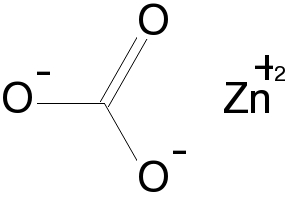Pharmaceutical & Fine Chemicals
HI! I’M ELEMENT AI.
Zinc Carbonate

Product Description
Zinc carbonate is a chemical compound with several industrial applications due to its unique properties.
Product:
Zinc Carbonate
CAS:
3486-35-9
Synonym:
Carbonic acid, zinc salt; Zinc monocarbonate
Structure:

Typical Characteristics
Appearance
White crystalline powder
Density
4.4 g/cm3
Melting point
140 °C (decomposes)
Molecular Weight
125.4
Odor
Odorless
Purity
99%
Refractive index
1.82
Uses, Applications & Markets
Key applications
get a quote
We Offer Zinc Carbonate
in various grades
A few of the grades available are listed below:



Zinc Carbonate used in many
industry applications
Zinc carbonate is a chemical compound with the formula ZnCO3. It has several industrial applications due to its unique properties. Here are some of its uses:
- Paints and Coatings: Zinc carbonate is utilized as a pigment and filler in the formulation of paints, coatings, and varnishes. It provides excellent hiding power, opacity, and corrosion resistance to coatings applied on metal substrates such as steel structures, automotive parts, and industrial machinery. Zinc carbonate-based coatings offer long-lasting protection against weathering and chemical exposure.
- Rubber Vulcanization: Zinc carbonate is used as an activator in the vulcanization process of rubber compounds. It reacts with sulfur during the curing process to form zinc sulfide, which acts as a crosslinking agent between rubber polymer chains. This improves the mechanical properties, durability, and heat resistance of vulcanized rubber products such as tires, hoses, gaskets, and seals.
- Ceramics and Glass: Zinc carbonate is employed as a fluxing agent and opacifier in the production of ceramics and glassware. It lowers the melting point of ceramic glazes and enhances their fluidity, allowing for smoother and more uniform surface finishes. Zinc carbonate-based glazes are used in the decoration of ceramic tiles, tableware, sanitaryware, and architectural ceramics.
- Pharmaceuticals: Zinc carbonate is used in pharmaceutical preparations as an antiseptic and astringent agent for topical applications. It helps reduce inflammation, soothe skin irritation, and promote wound healing in medicated creams, lotions, and powders. Zinc carbonate-based formulations are used in dermatological treatments for conditions such as acne, eczema, and diaper rash.
- Electroplating: Zinc carbonate is employed as a precursor in the electroplating industry for the deposition of zinc metal coatings on metal substrates. It is dissolved in acidic solutions to produce zinc ions, which are then electrodeposited onto steel, iron, or aluminum surfaces to provide corrosion protection, decorative finishes, or solderability. Zinc carbonate-based plating baths are used in automotive, construction, and consumer electronics industries.
- Animal Feed Supplements: Zinc carbonate is used as a dietary supplement for livestock and poultry to fulfill their nutritional requirements for zinc. It is added to animal feed formulations to prevent zinc deficiency, promote growth, and enhance immune function in livestock animals such as cattle, pigs, chickens, and turkeys. Zinc carbonate supplements contribute to healthy bone development and reproductive performance in animals.
- Fire Retardants: Zinc carbonate is utilized as a component of fire-retardant formulations for textiles, plastics, and building materials. It acts as a synergist or flame inhibitor in combination with other flame retardants to reduce the flammability and smoke emission of materials exposed to fire. Zinc carbonate-based fire retardants are used in upholstery fabrics, cables, electrical enclosures, and construction materials.
- Industrial Catalysts: Zinc carbonate is employed as a catalyst or catalyst support in various industrial processes such as petrochemical refining, chemical synthesis, and environmental remediation. It can catalyze reactions such as esterification, hydrogenation, and dehydrogenation in the production of fine chemicals, polymers, and pharmaceutical intermediates. Zinc carbonate catalysts offer high activity, selectivity, and stability under harsh reaction conditions.
- Water Treatment: Zinc carbonate is used in water treatment applications for the removal of heavy metals and toxic contaminants from industrial effluents and wastewater streams. It can precipitate heavy metal ions such as lead, cadmium, and copper through chemical precipitation or adsorption mechanisms. Zinc carbonate-based treatment processes help meet regulatory discharge limits and protect aquatic ecosystems.
- Art Conservation: Zinc carbonate is employed in the conservation and restoration of artworks, paintings, and historical artifacts. It is used as a filler or extender in the preparation of conservation materials such as adhesives, fillers, and paints. Zinc carbonate-based formulations help repair damaged surfaces, fill cracks and voids, and stabilize fragile substrates without altering the original appearance or properties of the artwork.